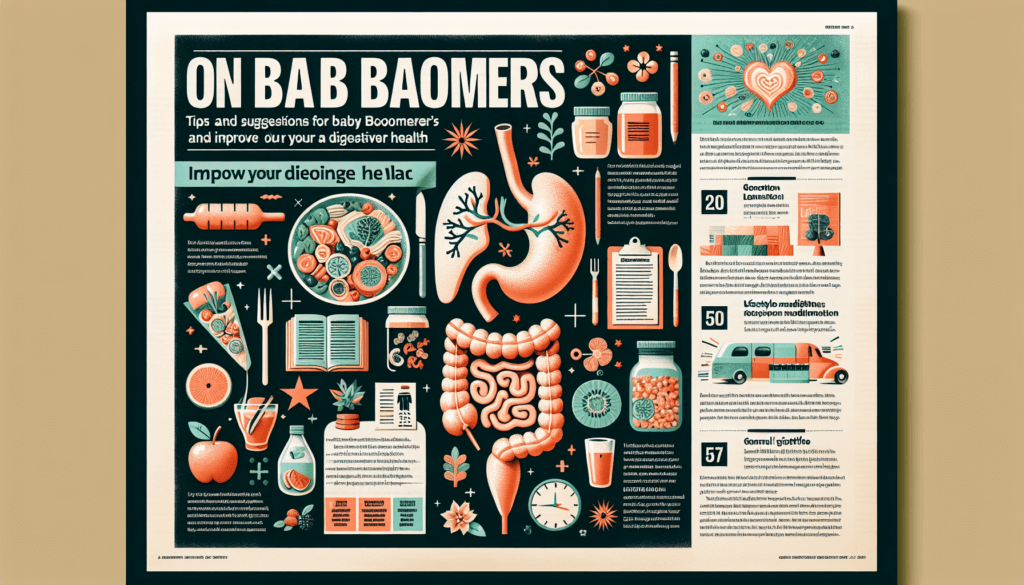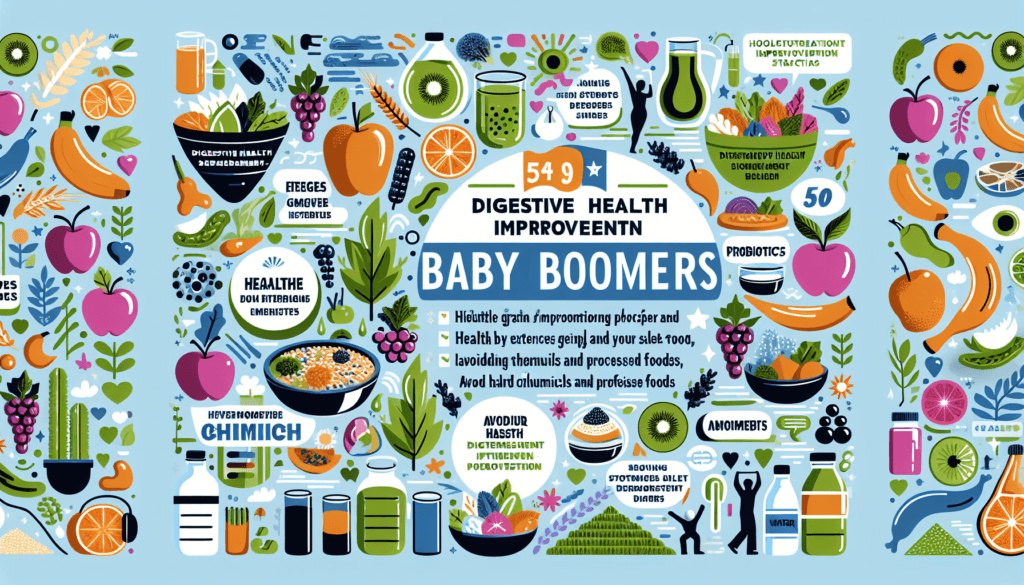Are you a boomer looking to enhance your digestive health through nutrition? Look no further! In this article, we will explore various dietary changes and habits that can help improve digestion and promote overall well-being. From incorporating fiber-rich foods into your meals to staying hydrated and practicing portion control, we’ve got you covered. So, if you’re ready to embark on a journey towards better digestive health, let’s dive in and discover the power of nutrition for boomers like you!
The Importance of Digestive Health in Boomers
Digestive health is a crucial aspect of overall well-being, and it becomes even more important as we age. As a baby boomer, taking care of your digestive system is essential for maintaining a healthy and active lifestyle. Understanding the importance of digestive health, the prevalence of digestive issues in boomers, and the impact it has on your overall well-being are fundamental steps in prioritizing your digestive health.
Understanding Digestive Health
Digestive health refers to the proper functioning of your gastrointestinal tract, which includes the organs responsible for digestion and absorption of nutrients: the mouth, esophagus, stomach, small intestine, large intestine, rectum, and anus. When your digestive system is functioning optimally, it ensures that you can break down the food you eat, absorb essential nutrients, and eliminate waste products efficiently. Maintaining a healthy digestive system allows for better nutrient absorption, improved immune function, and enhanced overall health.

Prevalence of Digestive Issues in Boomers
Boomers are more prone to experiencing digestive issues compared to younger individuals. With age, structural and functional changes occur in the digestive system, making it more susceptible to developing problems. Digestive issues such as gastroesophageal reflux disease (GERD), irritable bowel syndrome (IBS), constipation, diverticulosis, and gallstones are commonly reported among boomers. These conditions can significantly impact your quality of life, leading to discomfort, pain, and reduced overall well-being.
Impact of Digestive Health on Overall Well-being
Maintaining good digestive health is not only about preventing discomfort or inconvenience. The health of your digestive system can have a profound impact on your overall well-being. A healthy gut plays a vital role in nutrient absorption, immune function, and mental well-being. Poor digestive health can contribute to nutrient deficiencies, weaken your immune system, and even affect your mood and cognitive function. By prioritizing your digestive health, you can increase your energy levels, improve your immune response, and enhance your overall quality of life.

Common Digestive Issues in Boomers
Boomers are susceptible to several common digestive issues due to age-related changes in the digestive system. Understanding these conditions can help you identify and address any potential problems. Some of the most prevalent digestive issues in boomers include:
Gastroesophageal Reflux Disease (GERD)
GERD is a chronic condition characterized by the backflow of stomach acid into the esophagus. This can lead to symptoms such as heartburn, regurgitation, and difficulty swallowing. The weakening of the lower esophageal sphincter and lifestyle factors like obesity and smoking can contribute to the development of GERD in boomers. Managing GERD involves making dietary and lifestyle modifications to reduce symptoms and prevent complications.
Irritable Bowel Syndrome (IBS)
IBS is a gastrointestinal disorder that causes abdominal pain, bloating, changes in bowel habits (diarrhea or constipation), and discomfort. While the exact cause of IBS is unknown, triggers such as stress, certain foods, and hormonal changes can worsen symptoms. Managing IBS often involves a combination of dietary adjustments, stress management, and medications to alleviate symptoms and improve quality of life.
Constipation
Constipation is a common digestive issue characterized by infrequent bowel movements and difficulty passing stool. In boomers, factors such as reduced physical activity, inadequate water intake, and certain medications can contribute to constipation. Increasing fiber intake, staying hydrated, and incorporating regular exercise can help alleviate and prevent constipation.
Diverticulosis
Diverticulosis is the presence of small pouches (diverticula) that form in the lining of the colon. While most people with diverticulosis don’t experience symptoms, some may experience abdominal pain, bloating, and changes in bowel habits. A diet high in fiber can help prevent complications such as diverticulitis, which occurs when the diverticula become inflamed or infected.
Gallstones
Gallstones are hardened deposits that form in the gallbladder. They can cause pain in the upper abdomen, bloating, and digestive disturbances. Boomers are at an increased risk of developing gallstones due to age-related changes in bile composition. Eating a balanced diet, maintaining a healthy weight, and limiting high-fat foods can help reduce the risk of gallstones.
Key Nutrients for Digestive Health
Proper nutrition plays a crucial role in supporting digestive health. Including certain nutrients in your diet can help promote optimal digestion and prevent digestive issues. Some key nutrients for digestive health in boomers include:
Fiber
Fiber is an essential nutrient for maintaining digestive health. It helps regulate bowel movements, prevents constipation, and provides a feeling of fullness. There are two types of fiber: soluble and insoluble. Soluble fiber absorbs water and forms a gel-like substance, while insoluble fiber adds bulk to the stool. Both types are important for digestive health and can be found in fruits, vegetables, whole grains, legumes, and nuts.
Probiotics
Probiotics are beneficial bacteria that support the balance of gut flora. These live microorganisms help maintain a healthy gut environment and aid in the digestion and absorption of nutrients. Probiotic-rich foods include yogurt, kefir, sauerkraut, and kimchi. Additionally, probiotic supplements can be taken to increase the intake of beneficial bacteria.
Prebiotics
Prebiotics are a type of fiber that serves as food for probiotics. They promote the growth of beneficial bacteria in the gut. Foods rich in prebiotics include garlic, onions, asparagus, bananas, and oats. Including prebiotics in your diet helps support the growth and activity of probiotics, contributing to a healthy gut.
Digestive Enzymes
Digestive enzymes help break down food into smaller, absorbable molecules. As we age, our natural enzyme production may decrease, affecting the digestion and absorption of nutrients. Certain foods, such as papaya, pineapple, ginger, and fermented foods, contain natural digestive enzymes. Additionally, digestive enzyme supplements can be used to aid digestion and improve nutrient absorption.
Omega-3 Fatty Acids
Omega-3 fatty acids have anti-inflammatory properties and can help reduce inflammation in the digestive tract. They are found in fatty fish like salmon, mackerel, and sardines, as well as flaxseeds, chia seeds, and walnuts. Including omega-3 fatty acids in your diet can help support a healthy gut and reduce the risk of digestive disorders.

Fiber: The Digestive Health Superstar
Of all the nutrients for digestive health, fiber stands out as a superstar. It is essential for proper digestion, maintaining regular bowel movements, and supporting overall gut health.
Types of Fiber
There are two main types of fiber: soluble and insoluble fiber. Soluble fiber dissolves in water, forming a gel-like substance in the digestive system. Insoluble fiber remains unchanged as it passes through the digestive tract, adding bulk to the stool.
Recommended Fiber Intake
Adults over the age of 50 should aim to consume about 25 grams of fiber for women and 38 grams for men daily. However, many boomers fall short of meeting these recommendations. Increasing fiber intake gradually and staying well-hydrated can help prevent digestive discomfort and allow your body to adapt to the increased fiber intake.
Benefits of Fiber for Boomers
Fiber offers several benefits for boomers’ digestive health. It promotes regular bowel movements, prevents constipation and hemorrhoids, and supports a healthy weight. Additionally, fiber can help regulate blood sugar levels, lower cholesterol, and reduce the risk of cardiovascular disease and certain types of cancer.
Sources of Fiber in the Diet
Fiber-rich foods include fruits, vegetables, whole grains, legumes, and nuts. Incorporating high-fiber choices such as berries, broccoli, quinoa, lentils, and almonds into your meals and snacks can help meet your daily fiber needs. It’s important to choose a variety of fiber-rich foods to obtain the different types of fiber and achieve maximum benefits for your digestive health.
Harnessing the Power of Probiotics
Probiotics are beneficial bacteria that can have a positive impact on your digestive health. Including probiotic-rich foods and supplements in your diet can help support the balance of gut flora and improve digestion.
What are Probiotics?
Probiotics are live bacteria and yeasts that provide health benefits when consumed in adequate amounts. They help maintain a healthy gut microbiome by crowding out harmful bacteria, producing beneficial compounds, and enhancing the function of the immune system in the gut.
Probiotic Foods and Supplements
Probiotics can be obtained through certain foods and supplements. Foods like yogurt, kefir, sauerkraut, and kimchi contain live cultures of beneficial bacteria. Including these foods in your diet regularly can naturally increase your probiotic intake. Additionally, probiotic supplements are available in various forms and strains, allowing you to choose the most suitable option for your specific digestive needs.
Health Benefits of Probiotics
Probiotics offer several health benefits for boomers. They can help alleviate symptoms of digestive issues such as bloating, diarrhea, and constipation. Probiotics also promote regular bowel movements, enhance nutrient absorption, and support a healthy immune system. Furthermore, some research suggests that probiotics may have a positive impact on mental health by reducing symptoms of anxiety and depression.
Choosing the Right Probiotic
When choosing a probiotic supplement, it’s essential to consider factors such as the specific strains, potency, and quality. Different strains of probiotics have different benefits, so it’s important to select a probiotic that targets your specific digestive concerns. Consulting with a healthcare professional or registered dietitian can help you choose the most suitable probiotic for your needs.

The Role of Prebiotics in Digestive Health
Prebiotics are dietary fibers that serve as food for probiotics, promoting their growth and activity in the gut. Including prebiotic-rich foods in your diet can help support the beneficial bacteria in your gut and contribute to better digestive health.
Understanding Prebiotics
Unlike probiotics, which are live microorganisms, prebiotics are nondigestible fibers that pass through the digestive system intact. They reach the colon undigested, where they selectively stimulate the growth and activity of beneficial bacteria.
Prebiotic Foods
Several foods contain prebiotic fibers. Garlic, onions, leeks, asparagus, bananas, oats, and chicory root are excellent sources of prebiotics. Incorporating these foods in your meals and snacks can help nourish the probiotics in your gut and support a healthy balance of gut bacteria.
Health Benefits of Prebiotics
Prebiotics offer several health benefits for boomers. They enhance the growth of beneficial bacteria, support a healthy gut microbiome, and promote regular bowel movements. Prebiotics also contribute to the production of short-chain fatty acids, which provide energy for the cells in the colon and have anti-inflammatory properties. Additionally, prebiotics can help regulate blood sugar levels and improve calcium absorption, promoting bone health.
Combining Prebiotics with Probiotics
Combining prebiotics with probiotics can have a synergistic effect on your digestive health. The prebiotics provide nourishment for the probiotics, helping them thrive and exert their beneficial effects in the gut. Consuming both prebiotics and probiotics through diet and supplementation can work together to support a healthy gut microbiome and improve digestion.
Boosting Digestive Enzymes with Diet
Digestive enzymes are essential for breaking down food into smaller, absorbable molecules. As we age, our natural enzyme production may decrease, affecting digestion. Including certain foods rich in digestive enzymes in your diet or using enzyme supplements can help support optimal digestion and nutrient absorption.
Digestive Enzymes and their Importance
Digestive enzymes are proteins produced by the body that help break down carbohydrates, proteins, and fats into smaller molecules that can be absorbed. Different enzymes are responsible for specific tasks in the digestion process. For example, amylase breaks down carbohydrates, protease breaks down proteins, and lipase breaks down fats.
Foods Rich in Digestive Enzymes
Certain foods contain natural digestive enzymes that can support digestion. Pineapple and papaya, for example, contain bromelain and papain, respectively, both of which aid in protein digestion. Ginger is another food rich in digestive enzymes, particularly aiding in breaking down carbohydrates. Fermented foods like sauerkraut and kimchi also contain enzymes that can contribute to better digestion.
Supplementing with Digestive Enzymes
If you’re experiencing digestive issues or have a condition that affects enzyme production, such as pancreatic insufficiency, enzyme supplements may be beneficial. These supplements can provide additional support by providing specific enzymes that your body may not be producing in sufficient amounts. It’s important to consult with a healthcare professional or registered dietitian before starting enzyme supplementation to ensure proper dosing and effectiveness.

Omega-3 Fatty Acids for Digestive Health
Omega-3 fatty acids are a type of polyunsaturated fat known for their anti-inflammatory properties. Including omega-3-rich foods or taking omega-3 supplements can contribute to a healthy gut and reduce the risk of digestive disorders.
The Benefits of Omega-3 Fatty Acids
Omega-3 fatty acids have numerous benefits for digestive health. They help reduce inflammation in the digestive tract, which can alleviate symptoms of inflammatory bowel disease (IBD) and irritable bowel syndrome (IBS). Omega-3 fatty acids also support the production of anti-inflammatory compounds, contribute to a healthier gut microbiome, and promote better gut motility.
Sources of Omega-3 Fatty Acids
Fatty fish like salmon, mackerel, sardines, and trout are excellent sources of omega-3 fatty acids. Plant-based sources include flaxseeds, chia seeds, walnuts, and hemp seeds. Including these foods in your diet regularly can help increase your omega-3 fatty acid intake. If you’re not able to consume enough omega-3-rich foods, omega-3 supplements derived from fish oil or algae are also available.
Supplementing with Omega-3 Fatty Acids
Omega-3 supplements can be beneficial for boomers who may not consume enough omega-3-rich foods. It’s important to choose a high-quality supplement that provides the recommended dosage of omega-3 fatty acids. Consulting with a healthcare professional or registered dietitian can help determine the appropriate dosage and type of omega-3 supplement for your specific needs.
Optimizing Digestive Health Through Dietary Habits
Beyond specific nutrients, several dietary habits can help optimize your digestive health. By making simple adjustments to your eating habits, you can support your digestive system and prevent potential issues.
Eating a Balanced and Varied Diet
Eating a balanced and varied diet is key to supporting your digestive health. Aim to include a wide variety of fruits, vegetables, whole grains, lean proteins, and healthy fats in your meals. This ensures that you obtain a diverse range of nutrients, fiber, and antioxidants necessary for optimal digestion and overall well-being.
Hydrating for Digestive Health
Staying well-hydrated is crucial for maintaining healthy digestion. Water helps soften stools, prevent constipation, and promote regular bowel movements. Aim to drink at least eight glasses of water per day, and consume hydrating foods such as cucumbers, watermelon, and celery to support your fluid intake.
Managing Portion Sizes
Portion control is important for optimal digestion. Eating large meals can put stress on the digestive system and lead to discomfort. Instead, aim to eat smaller, more frequent meals throughout the day. This allows your digestive system to work more efficiently and reduces the likelihood of feeling overly full or bloated.
Chewing Food Thoroughly
Chewing your food thoroughly is a simple yet effective habit for promoting digestion. Properly chewing your food breaks it down into smaller particles that are easier to digest and absorb. Taking the time to chew your food thoroughly also aids in the release of digestive enzymes, supporting the overall digestive process.
Avoiding Trigger Foods
Identifying and avoiding trigger foods can help prevent digestive discomfort. Certain foods, such as spicy foods, greasy foods, processed foods, and beverages high in caffeine or alcohol, can aggravate digestive issues. Pay attention to how your body reacts to different foods and make adjustments as needed to avoid potential triggers.
Seeking Professional Advice for Digestive Health
While dietary modifications can go a long way in improving digestive health, it’s important to seek professional advice when needed. Consulting with a healthcare professional or registered dietitian can provide personalized guidance and recommendations for managing digestive issues and optimizing your overall well-being.
Importance of Seeking Medical Advice
If you’re experiencing persistent or severe digestive symptoms, it’s crucial to seek medical advice. Persistent symptoms may indicate an underlying condition that requires medical evaluation and treatment. Seeking timely medical attention can help identify and address any potential issues effectively.
Working with a Registered Dietitian
A registered dietitian can provide expert guidance on optimizing your digestive health through nutrition. They can help create a personalized eating plan tailored to your specific needs and preferences. A dietitian can also provide guidance on managing specific digestive conditions, such as GERD or IBS, and recommend appropriate dietary modifications.
Holistic Approach to Digestive Health
Taking a holistic approach to digestive health involves addressing not only dietary factors but also lifestyle factors that may impact your digestive system. This includes managing stress levels, getting regular physical activity, and addressing any other underlying health conditions. By addressing all aspects of your well-being, you can optimize your digestive health and enjoy a higher quality of life as a boomer.


